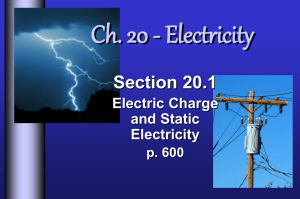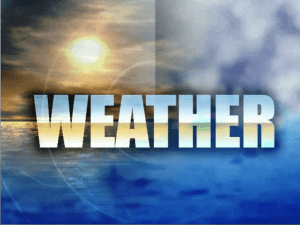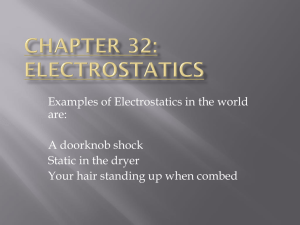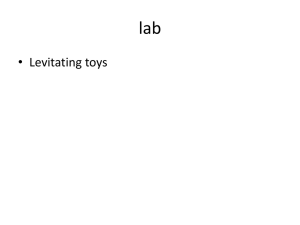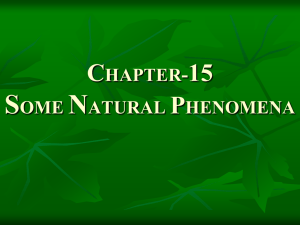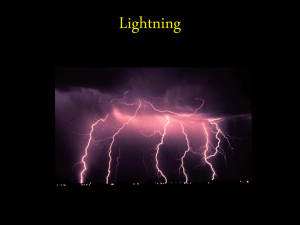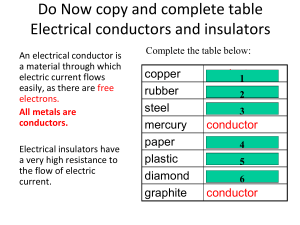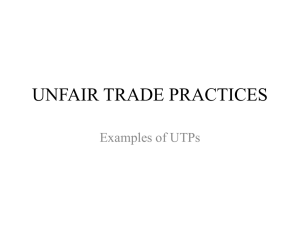CHAPTER 15 SOME NATURAL PHENOMENA
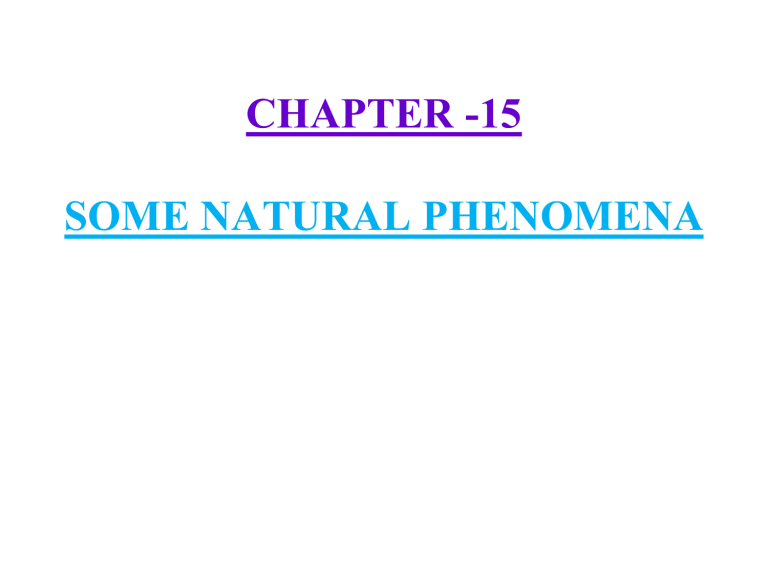
CHAPTER -15
SOME NATURAL PHENOMENA
1) Some natural destructive phenomena :-
Some natural destructive phenomena are cyclones, lightning, earthquakes etc.
Lightning is streaks of bright light and sound caused by electric discharge between clouds and earth or between different clouds.
Earthquake is a sudden shaking or trembling of the earth caused by a disturbance deep inside the earth’s crust.
Lightning and earthquakes cause a lot of damage to human life and property.
2) Charging by rubbing (friction) :-
Some objects can be charged by rubbing with other objects. When objects are rubbed, they attract light objects like pieces of paper. This process is called charging by friction.
Eg :- A plastic refill, scale or comb when rubbed with dry hair, paper or polythene gets charge and attracts pieces of paper.
The charges acquired by rubbing are static charges. They do not move. When charges move, it is electric current.
Electric current is the motion of charges through a conductor.
3) Types of charges and their interaction :-
There are two types of charges. They are positive charge
(+) and negative charge (-).
Two charged bodies may attract or repel each other.
Like (similar) charges repel each other and unlike
(dissimilar) charges attract each other.
a) Like charges repel each other :-
Activity :Inflate two balloons and hang them in such a way that they do not touch each other. Rub both the balloons with a piece of woollen cloth and release them.
They repel each other.
Activity :Rub a plastic refill with polythene and place it in a glass tumbler. Rub another plastic refill with polythene and bring it near the charged refill. They repel each other.
b) Unlike charges attract each other :-
Activity :Charge a plastic refill by rubbing with polythene and keep it in a glass tumbler. Charge an inflated balloon by rubbing with a piece of woolen cloth and bring it near the charged plastic refill. They attract each other.
c) Charges acquired by different objects :-
A glass rod rubbed with silk gets positively charged.
A plastic rod rubbed with fur gets negatively charged.
Frictional order :-
Wool
Flannel
Fur
Sealing wax
Glass
Paper
Silk
Hand
Rubber
Amber
Ebonite
Plastic
When any of these materials are rubbed together, the one in the higher order gets positive charge(+) and the one in the lower order gets negative charge (-)
A glass rod rubbed with silk gets positive charge (+)
An ebonite rod rubbed with fur gets negative charge (-)
4) Electroscope :-
An electroscope is a device used to test whether an object is having electric charge or not.
A simple electroscope can be made by using an empty bottle, a piece of cardboard, a paper clip and two small strips of aluminium foil. Pass one end of the paper clip through the cardboard and hang the two aluminiun strips from the other end.
If a charged body is touched to the end of the paper clip, the aluminium strips repel each other.
5) Transfer of charge :-
When a charged body is brought in contact with an uncharged body charges pass from the charged body to the uncharged body.
This method of charging a body is called charging by contact or conduction.
If a body is charged by contact it gets the same charge as the charged body.
We can observe the transfer of charge by using an electroscope . If a charged plastic rod is brought in contact with an electroscope, the charges are transferred to the metal strips and they repel each other.
This is because both the metal strips get the same charge and they repel each other.
6) Electric discharge :-
If we touch a charged electroscope with our hand, the charges pass through our body to the earth and the metal strips collapse. This property is called electric discharge.
The process of transferring electric charges from a charged body to the earth is called earthing.
Earthing is provided in buildings to protect us from electric shock due to leakage of electric current.
7) Lightning :-
During thunderstorms air currents move upwards and water droplets move downwards. This movement causes separation of charges in the clouds. The positive charges collect at the upper part and negative charges collect at the lower part of the clouds. Some negative charges collect near the ground also. When a large amount of charge is formed, then the charges pass from the clouds to the earth producing streaks of light and sound. The light produced is called lightning and the sound produced is called thunder.
It was Benjamin Franklin who first discovered that lightning was electric discharge.
8) Lightning conductor :-
A lightning conductor is a device used to protect buildings from damage due to lightning.
A lightning conductor has a metallic rod. The upper end is pointed and the lower end is joined to a metal plate buried inside the ground.
When lightning strikes, the electric charges pass through it to the earth without causing any damage to the building.
9) Protection from lightning and thunderstorm :-
a) If you are outdoors :i) Open vehicles like motorbikes, trucks, open cars are not safe.
ii) Open fields, parks, elevated places, tall trees are not safe.
iii) Carrying an umbrella is not safe.
iv) If in a forest take shelter under short trees.
v) If in an open field stay away from trees, poles, metallic objects. Do not lie down. Squat on the ground with hands on the knees and the head between the hands.
b) If inside the house :i) Lightning can strike electric wires, telephone cords and metal pipes so contact with these objects should be avoided.
ii) It is safer to use mobile and cordless phones than wired phones.
iii) Electrical appliances like TV, computers etc should be unplugged.
iv) Bathing should be avoided to avoid contact with running water.
10) Earthquakes :-
An earthquake is a sudden shaking or trembling of the earth caused by a disturbance deep inside the earth’s crust.
Earthquakes cause damage to buildings, dams, bridges. It can cause landslides, floods and tsunamis. It can also cause damage to life and property.
11) What cause an earthquake ?
The outermost layer of the earth called crust is not one piece. It is fragmented into many plates.
These plates are moving continuously.
When these plates brush past each other or when one plate goes under another plate due to collision, they cause disturbance and causes earthquakes.
The boundaries of the plates are weak zones called siesmic zones or fault zones.
Earthquakes often occur in the seismic zones.
The seismic zones in India are Kashmir, Himalayas, Indo Gangetic plane, North eastern region, Kutch, Rajasthan, Andaman And Nicobar
Islands some regions of South India etc.
The power of an earthquake is measured on a scale called Richter scale . Very destructive earthquakes have magnitudes more than 7.5 on the Richter scale.
Earthquakes produce waves on the surface of the earth called seismic waves.
Seismic waves are recorded by an instrument called seismograph.
.
Seismic zones of India :-
12) Protection from earthquakes :-
i) The buildings in seismic zones should be designed such that they can withstand tremors due to earthquakes.
ii) Materials like mud, wood and light roof should be used instead of heavy materials.
iii) Heavy objects like cupboards, water heaters etc. should not be fixed on the walls.
iv) All buildings should have fire fighting equipments.
Precautions during an earthquake :a) If you are at home :i) Take shelter under a table.
ii) If you are in bed do not get up. Protect your head with a pillow.
iii) Stay away from tall and heavy objects which may fall on you.
b) If you are outdoors :i) Find an open area away from buildings, trees and power lines and lie on the ground.
ii) If you are in a car or bus ask the driver to slow don and don’t get out till the tremors stop.

